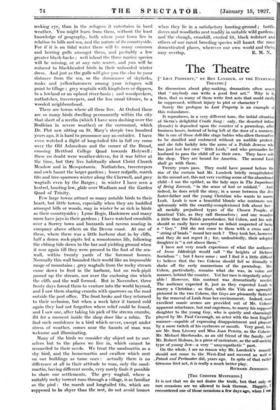The Theatre
[" LOST PROPERTY,.' HY BEN LANDECK, AT THE EVERYMAN THEATRE.] IN discussions about play-making, dramatists often assert that " anybody can write a good first act." Why is it, then, that so many of them write first acts that could easily be suppressed, without injury to plot or character ?
Surely the prologue to Lost Property is an example of this redundance.
It reproduces, in a very different tone, the initial situation of Sierra's delightful Cradle Song : only, the deserted infant (female) is deposited upon the counter of a pawnshop, after business hours, instead of being left at the door of a nunnery. She is one of those doll-like stage babies who allow themselves to be dandled and embraced without an audible protest and she falls luckily into the arms of a Polish Jewess who has just lost her own " little Leah," and who persuades her husband to pass the child off as their own. They have sold the shop. They are bound for America. The second Leah shall go with them.
. Twenty years pass. They could have passed before the rise of the curtain had Mr. Landeck briefly recapitulated, in the second act, this not very exciting scene of the abandoned child—I use the epithet, as the lady says in The Importance of Being Earnest, " in the sense of lost or mislaid." And, indeed, he does retell the story, in a scene between the Jew foster-father and the young Christian who wants to marry Leah. Leah is now a beautiful blonde who contrasts con• spicuously with the swarthy-complexioned folk about her– all racially prejudiced types of the Chosen People, all fanatical Yids, as they call themselves ; and one wonders a little that the Polish pawnbroker, Sol Cohen, and his wife, should so easily have accepted an infant suspected of being a " Goy." Did she not come to them with a cross and a " string of beads " round her neck ? They took her, however, and they do not regret it ; for, undoubtedly, their adopted daughter is " a cut above them."
I have not very much experience of what the authoress of Irene Iddesleigh would call " the heights of Hebrew Socialism " ; but I have some ; and I find it a little difficult to believe that the two Cohens should fail so dismally to shake off the early mannerisms of the pawnshop. Mrs. Cohen, particularly, remains what she was, in voice and manner, behind the counter. Yet her race is singularly adapt- able However, this contrast was dramatically needed. The audience expected it, just as they expected Leah to marry a Christian ; so that, while the Yids are agreeably pictured in the two Cohens, the Goys are pleasantly flattered by the removal of Leah from her environment. Indeed, some excellent comic scenes are provided out of Mr. Cohen's apparent reluctance, but real eagerness, to marry his supposed daughter to the young Goy, who is quietly and charmingly
played by Mr. Paul Cavanagh, an actor with the best English manner—capable of expressing disappointment and pleasure by a mere twitch of his eyebrows or mouth. Very good, too, are Mr. Sam Livesey and Miss Joan Pereira, as the Cohens; Mr. Michael Sherbrooke, as an old friend of the family, and Mr. Robert Holmes, in a piece of caricature, as the self-seeking type of -young Jew—a very " unsympathetic " part.
On the whole, I see no reason why Mr. Landeck's comedy should not come to the West-End and succeed as well as Potash and Perlmutter did, years ago. In spite of that rather tiresome first act, it is really a much better play.
RicrutaD JENNINGS.


































 Previous page
Previous page